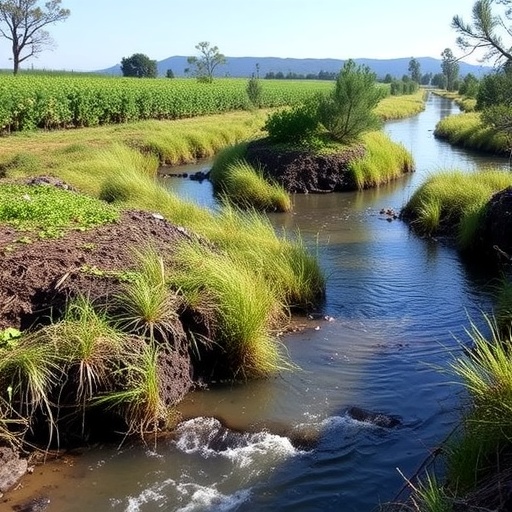In a world increasingly aware of environmental issues, the Pampas region of Argentina stands out as a crucial focal point of ecological study. Researchers from Argentina, including notable scientists Viozzi, Williner, and Iturburu, have undertaken a comprehensive examination of three vital water reserves in this region. Recognizing the importance of both environmental quality and ecological risk assessment, their work highlights the intricate relationships between water resources and biodiversity. As the world grapples with climate change, pollution, and habitat destruction, such studies become integral to understanding the health of ecosystems globally.
The Pampas region itself is characterized by rich agricultural lands and a variety of ecosystems, making it an essential area for both environmental conservation and economic development. However, with agricultural practices often putting pressure on natural resources, studies like this one play a pivotal role in evaluating the sustainability of these practices. The pressing need for a balance between human activity and ecological integrity is at the core of Viozzi and colleagues’ research, which illuminates the delicate interdependence of various environmental components.
One critical aspect of the study involves assessing the water quality within these reserves. Water, being a lifeline for both humans and wildlife, was analyzed for various chemical parameters and indicators of ecological health. This thorough analysis allows researchers to understand how anthropogenic factors—such as agricultural runoff, industrial discharges, and urbanization—affect the reserves. Their findings reveal that contamination from these sources can significantly diminish water quality, posing risks not only to aquatic life but also to human health.
In addition to chemical assessments, the study also delves into biological indicators that reflect the state of the aquatic environments within the reserves. By examining the health of various species and their populations, the researchers can paint a more comprehensive picture of ecological well-being. Biodiversity is a vital indicator of ecological resilience; thus, tracking changes in species composition and abundance reveals much about the health of an ecosystem. The implications of biodiversity loss are profound, triggering a cascade of ecological consequences that can affect ecosystem services essential for human survival.
Moreover, the ecological risk assessment component of their research addresses potential hazards arising from the current state of environmental quality. Through a combination of modeling and field studies, the team has been able to identify specific risks associated with the contaminants found in the water reserves. Their assessments make clear that not all contaminants pose equal threats, urging policymakers to prioritize interventions based on the severity of associated risks. The study presents a clear call for action as it highlights the need for effective management practices that safeguard the ecological integrity of these vital water resources.
In exploring the findings of this research, one cannot overlook the broader implications for environmental policy and conservation strategies. Given that water resources serve as a cornerstone for agricultural productivity and community well-being, the study underscores the necessity for cooperative strategies. By engaging government agencies, non-governmental organizations, and local communities, efforts can be made to promote sustainable water management practices—something that is ultimately beneficial for both the environment and the economy.
This assessment also takes a critical view of the regulatory frameworks that govern water usage and quality in Argentina. The researchers advocate for stronger policies that not only enhance water quality monitoring but also bolster the enforcement of existing environmental legislation. Effective regulations can serve as a deterrent against pollution, promoting more responsible agricultural and industrial practices. The need for continuous monitoring and periodic assessments is reiterated as a vital tool for adaptive management of these precious resources.
As the research continues to make waves in the scientific community, it also invites or ignites public interest in the importance of preserving natural water systems. The findings have the potential to inspire grassroots initiatives aimed at improving water quality and biodiversity in the Pampas region. Community-driven conservation efforts could serve as a model for other regions facing similar environmental challenges.
Furthermore, the work of Viozzi et al. provides an essential framework for future research initiatives. By establishing baseline data and methodologies, this study lays the groundwork for ongoing assessments that will be crucial as conditions change—whether through natural fluctuations or anthropogenic influences. The dynamic nature of ecosystems demands vigilant observation, making continuous research not only relevant but necessary.
In conclusion, the comprehensive study conducted by Viozzi, Williner, and Iturburu sheds light on the pressing issues regarding environmental quality and ecological risk assessment in the Pampas region’s water reserves. As the balance between human activity and environmental preservation becomes increasingly precarious, the insights provided by this research can catalyze action. The ripple effects of improving water quality extend far beyond ecological boundaries; they touch upon public health, economic stability, and the quality of life for communities reliant on these water resources.
As this research garners attention, it serves to remind us of the critical role that water plays in sustaining life and the intricate web of interactions that define our natural world.
Subject of Research: Environmental quality and ecological risk assessment in water reserves
Article Title: Environmental quality and ecological risk assessment in three water reserves of the Pampas region (Argentina)
Article References:
Viozzi, M.F., Williner, V., Iturburu, F.G. et al. Environmental quality and ecological risk assessment in three water reserves of the Pampas region (Argentina).
Environ Sci Pollut Res (2025). https://doi.org/10.1007/s11356-025-36994-0
Image Credits: AI Generated
DOI: 10.1007/s11356-025-36994-0
Keywords: Water quality, ecological risk assessment, biodiversity, environmental management, Pampas region




